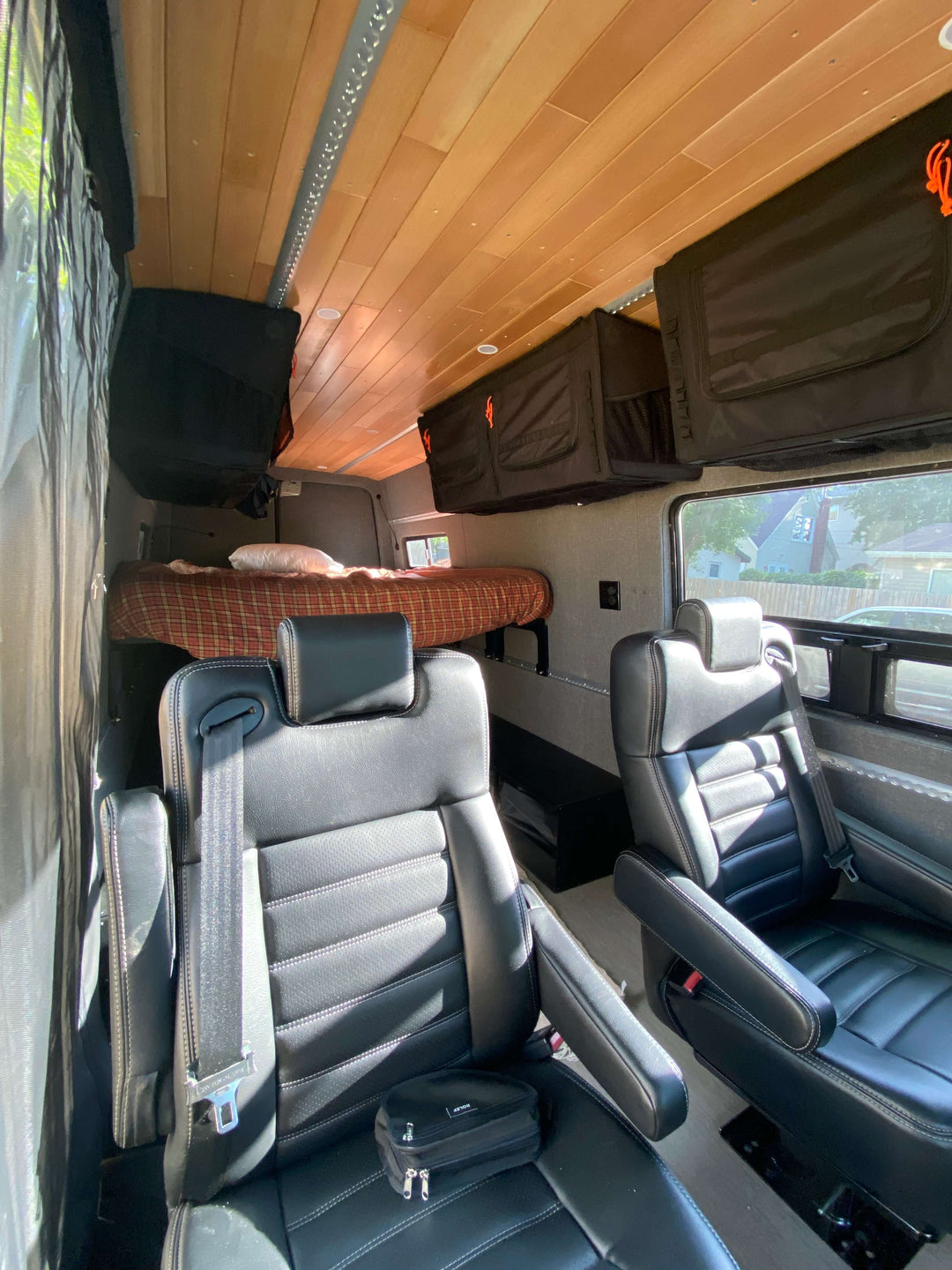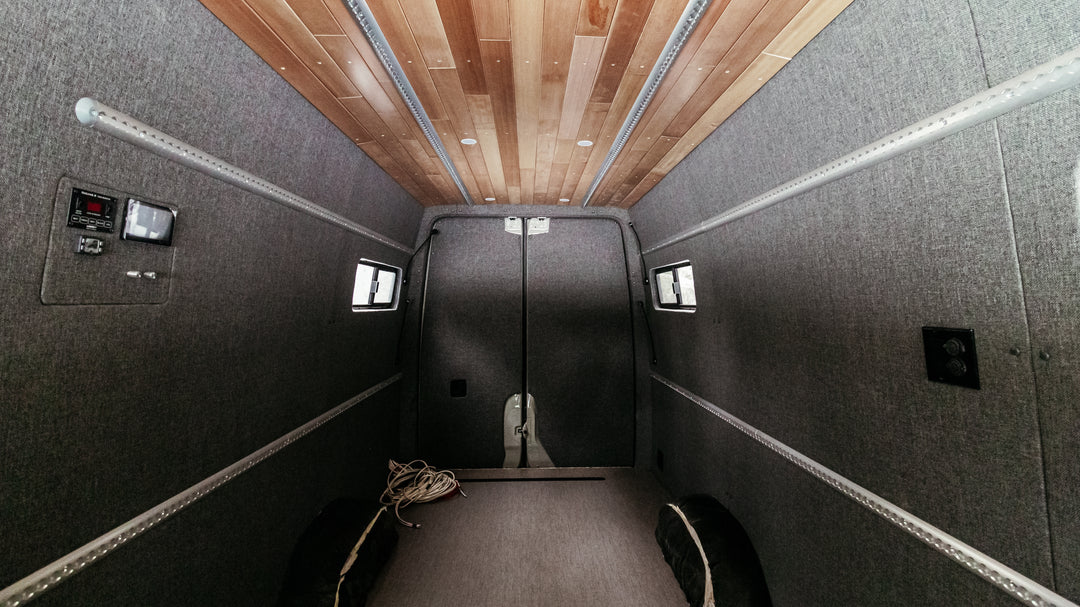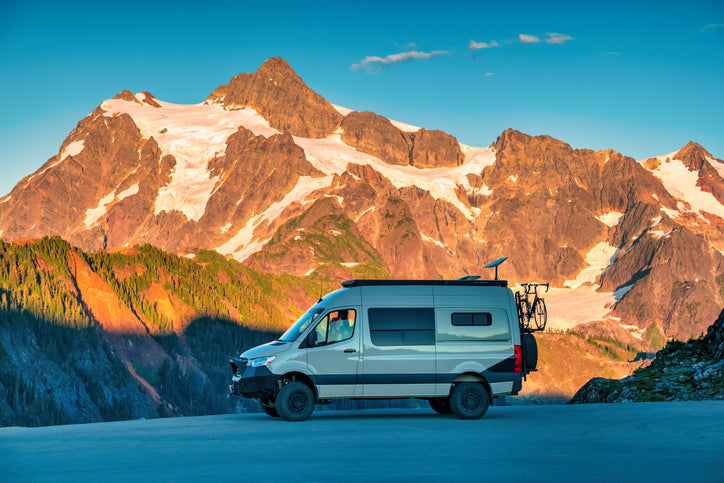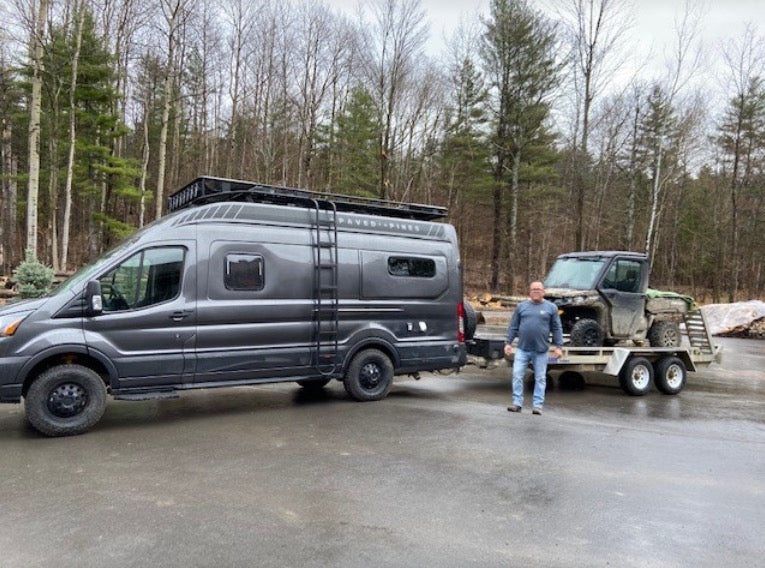Full Guide: Van Conversion Solar Power, Batteries and Electrical Systems

So you’re planning your campervan electrical system and don't know how to figure out the difference between a lithium battery and an AGM battery or how to figure out your solar power system needs?
You’ve come to the right place!
Figuring out how many solar panels and how many amp hours of batteries are needed for van life can be a complex process, so consider this article your guide.
Let’s get started!
What are the components of an RV solar system?
When it comes time to purchase solar panels, batteries, inverters, a charge controller, and the rest of your solar power system for your van conversion, make sure that they are compatible with the rest of the components you're buying.
While some products may look similar from one company to another, they may not work together without proper configuration by an expert technician or installer. It's always best to select products from the same brand so that compatibility issues don't arise during installation or use down the road.
One of our favourite electrical system brands to use is Victron. Not only can Victron provide a robust power system with as little or as much capability as you need but they also sell all of the components required for your entire electrical system making this whole process easier. From your power inverters, battery monitor, voltage regulator, charge controller, lithium iron phosphate batteries, and safety equipment, they have most, if not all, of what you need.
Let's break down the main components of a 12V off-grid electrical system one-by-one.

Solar panels
In today's world of renewable energy, monocrystalline and polycrystalline solar panels are two popular options for harnessing the sun's power. You can get these solar panels in a rigid solar panel form or a flexible solar panel form which glues onto the roof of your camper van.
With monocrystalline solar panels, you get more bang for your buck in terms of the amount of energy harvested. However, with polycrystalline solar panels come greater affordability and durability. Each solar panel can provide your van with clean and free electricity, however, these solar panels need a solar charge controller to control the power input.
How much solar power your will need depends on the rest of your system and your daily usage which we will calculate later.
MPPT Solar Charge controller (Maximum Power Point Tracking)
Did you know charge controllers are a critical element when connecting solar panels to battery banks? There are two kinds of charge controllers, MPPT and PWM, we only use MPPT in our van conversions.
Anyways, a charge controller regulates your solar input and prevents overcharging damage to your batteries by managing the charge and amperage being drawn from the solar panel.
It’s like having an onboard safety feature for your chargeable devices.
Without charge controllers, there would be no way of regulating how much charge is drawn from any given panel, leaving you with a battery bank destined for disaster!
So whether you’re building a massive tiny home solar system, or want to ensure peace of mind in your day-to-day operation, charge controllers offer an affordable solution to avoid potential damage or unexpected downtime.

Power Inverters
An inverter is a device that allows you to convert the direct current (DC) power stored in your battery into alternating current (AC) power, the type you get from shore power or a generator.
Inverters come in all shapes and sizes, ranging from small inverters with relatively low wattage output and portable inverters that fit conveniently in a glove box, all the way up to inverters with high amperage outputs capable of powering larger items like electric heaters or air conditioning units.
No matter your electrical system needs, you can find an inverter to suit your purposes - whether you require only a small power supply system for emergencies or need a high-powered campervan electrical system for extended full-time use.
Fuses, Wiring & Safety
When it comes to campervan electrical systems, it's crucial to make sure that all the wiring, fuses and safety features are in good working order.
Without proper fuses or wiring, a campervan can quickly become a fire hazard. To ensure campervan safety, check for proper gauge, rating and amperage before making any connections as well as using marine grade wiring with a Victron Lynx distributor and fuse set.
We love using the Lynx Distributor as a redundancy in every campervan electrical system we install.
Taking these precautionary steps can help keep vanlifers safe while they enjoy their journey on the road.
Alternator Charging
Every vehicle has a battery to run the systems and start the vehicle. When your vehicle's running, your alternator then recharges your starter battery and keeps it topped up as you drive.
In our case, we can use our alternator to charge our camper van batteries while we drive, it's wicked!
Think of it as a generator for your battery bank.
This DC-DC alternator charger is an important piece of equipment to have installed in every single campervan. Not only is it a great battery management system to keep your camper van batteries topped up, it really helps on shady days when your solar power system isn't bringing enough juice into your batteries.
This type of charger ensures that the alternator always charges the starter battery first before your camper van battery system. The built in battery management system helps prevent damage from overcharging and helps to extend the life of your batteries by not trying to simultaneously charge your van batteries and the starter battery.
It's like a bulk charger for your RV and when used in tandem with Solar power system, it's a great way to ensure your battery bank stays topped up on the road.

Shore Power Plug
Shore power is the ability to hook your RV up to an external 30 amp plug and draw electrical energy from it. This is a great way of supplementing your Solar energy, especially when parked for extended amounts of time. When coupled with solar panels, shore power can help to maintain optimal battery levels without having to rely on generator use.
We use a brand called Smart Plug as it is a superior product to standard RV shore power outlets that oftentimes are a fire hazard due to poor connections and wiring.
Mounting Hardware
With the right mounting hardware, you can make the most of your roof space. In addition to mounting your RV solar panels, you can mount gearboxes, kayaks, rooftop tents, and more. Keep in mind, depending on what you have on your roof, it can affect your gas mileage!
Miscellaneous Items
You will need a lot of other smaller items to wire up your RV electrical system. Things like this include something called a bus bar, which is an essential component for connecting circuits together while maintaining an additional layer of safety, as well as other items like breakers, fuses, and wire.
Overall, shore power for your RV is an essential aspect of campervan life. With the right wiring and knowledge, you can ensure that your RV is running at peak efficiency while also having access to 30 amp

Lithium batteries in a van conversion being installed.
Leisure Batteries
Batteries: the unsung heroes of off-grid living and renewable energy systems. So important they get a whole section for themselves and not to be confused with your starter battery, which starts your vehicle.
AGM and lithium batteries are labourers of love, transforming solar power, wind and other non-traditional sources of electricity into usable power that can be deployed in a variety of situations. AGM (absorbent glass mat) and lithium-ion batteries come in a range of sizes, allowing you to store power “in the bank” to use when needed - perfect for those who need flexibility in their electrical usage. Like you, you adventurer!
AGM Batteries
AGM (Absorbed Glass Mat) batteries are extremely durable, plus they have a decent life cycle with zero maintenance required; making them ideal for powering everyday campervan electrical systems without massive draws. They are a time-tested battery that have been around for ages. They blow Lithium out of the water when it comes to operating in cold temperatures (think below 0 degrees Celsius) even though it takes a toll on performance.
These AGM batteries are also extremely affordable in comparison to their Lithium peers. Depending on the brand, you could buy 3x100 Ah AGM batteries before you buy 1x100 Ah Lithium. But this also leads into some additional considerations.
Despite these awesome 'Pros', there are some downsides of AGM batteries. One of the biggest pitfalls is that AGM has a lower storage capacity compared to Lithium batteries in addition to being much heavier. AGM batteries can only use 50% of their capacity, this is called the Depth of Discharge (DOD). So when you're buying a 100Ah AGM battery, you only have a capacity of 50Ah of usable power. If you don't keep an eye on your battery monitor and continuously drain your batteries to below that 50% threshold, it can tremendously reduce the life cycle of your AGM batteries. With the limited discharge depth and the heavier weight, you'll need to double up on batteries to achieve a similar battery bank size while over doubling the weight going into your campervan.
Lithium Ion Batteries & Lithium Iron Phosphate batteries
The biggest benefit of lithium batteries, compared to other batteries, is the sheer amount of power they can store. These are what we would call deep cycle batteries which means they have the capability to be fully charged and fully discharged. Unlike AGM batteries, lithium batteries can use up to 80-90% of their amp hour storage, meaning you get more usable capacity for your buck. Using the same example we used for the AGM batteries, your 100Ah lithium battery will allow you to use 80Ah of battery before you need to charge it again. This means a more expensive upfront cost, as mentioned earlier roughly 3x the cost, but a much longer-lasting battery that may just end up paying for itself.
With that larger depth of discharge, it makes Lithium a no-brainer for people that are planning to have big draws on their electrical system with things like induction cooktops, 12 volt air conditioners, microwaves, ovens, and any other appliances you may want to pack into your adventure vehicle. Keep in mind, you still need a large enough battery bank to store enough power to run these appliances depending on your usage. Don't forget to calculate your wattage!
Lithium batteries are also around 50% lighter than AGM batteries, depending on the brand and model, isn't that insane? Half the weight and nearly double the usable battery storage.
When it comes to winter performance, lithium batteries need a tad more care versus AGM batteries due to their inferior cold-weather performance. Lithium batteries require temperature regulation to operate in freezing weather.
There are also a few different options when it comes to picking a lithium battery makes. You'll commonly see jargon like LiFePO4 (Lithium Iron Phosphate Batteries) and Li-Ion (Lithium Ion Batteries). LiFePO4 batteries are considered top of the class when looking at lithium batteries. They have a longer-lasting duty cycle, roughly 4x that of Lithium Ion Batteries. Lithium Ion Batteries are also capable of overheating and catching fire, whereas Lithium Iron Phosphate Batteries are not.
Being susceptible to certain weather and use conditions, a Lithium battery requires a BMS (Battery Management System) to self-regulate the interior components. It's considered the brain of the battery and manages the battery performance while being used and while it charges. It protects you and the battery.
The technology is fantastic with lithium batteries but it does have its faults. The main one is cost and its inability to charge in colder weather.
What's better, lithium or AGM batteries?
So with a Deep Cycle Lithium battery, you're getting:
- ~75% more depth of discharge (AKA usable battery storage).
- 50% lighter batteries.
- Longer lifespan.
- More expensive upfront but pays for itself in the long run.
- Not as good in winter conditions if the battery is outside in the cold.
With an AGM battery, you're getting:
- Very affordable and a great starting point.
- Proven technology.
- Perform better in cold weather.
- Less depth of discharge.
- Heavier batteries.
- Keeps replacement costs down but is more expensive in the long term.
When it comes to making a decision on what battery type to use for your own van conversion, it's not an easy answer. Except lead acid batteries, it's an easy answer to avoid them here. Otherwise, there is a lot of nuance to this question and you need to figure it out, mostly, on your own. What will your daily use be? Will you be using appliances with a high power draw and require a strong battery bank? Are you camping often, living in your vehicle or are you just going out on the weekends?
In summary, there is no one answer to the question of what's the best camper van batteries? Which batteries you choose will depend on your needs, budget, power draws and the weather conditions in which you plan to use them. Consider all of the factors before deciding which battery type is best for your van conversion project.
Popular Campervan Battery Brands

There are a lot of options out there for every component of your vans electrical system and
we've talked about brands for the rest of your solar power system. But what brands are available for your battery setup? There are endless options here too. Below is a list of some of the more popular camper van battery brands in no particular order.
Battle Born Batteries
- Some of the more popular heavy-duty lithium batteries in this space.
- They're a LiPo4 (Lithium Iron Phosphate) deep cycle battery.
- 5000+ duty cycles.
- Built-in battery management system.
- Available in different amp hours.
Go Power
- Releasing their new 100 amp hours LiFePo4 battery system.
- Built-in battery management system.
- Bluetooth-capable options.
- Built-in DC heating.
- Waterproof.
- 10-year warranty.
- Available in different amp hours.
- Carry other batteries like AGM and Lithium Ion.
- Sells complete electrical system kits that include solar panels, a charge controller, and more.
- Can run in series or parallel.
- Integrated cell balancing for longer-lasting battery life.
Renogy
- LiFePO4 deep cycle batteries.
- Bluetooth-capable options.
- Built-in battery management system.
- 4000+ duty cycles.
- Available in different amp hours.
- Built-in heating options.
- Sells complete electrical system kits that include solar panels, a charge controller, and more.
Lithionics
- Advanced LiFePO4 deep cycle batteries.
- Integrated cell balancing for longer-lasting battery life.
- Advanced battery management system (internal or external).
- Neverdie protection (power reserve for engine cranking to ensure you're never stranded).
- Advanced alternator fast charging at idle.
- Larger battery size (up to 630 amp hours in one battery box)
Victron
- Integrated cell balancing for longer-lasting battery life.
- Can run in series or parallel.
- Internal or external battery management system.
- Intuitive Bluetooth diagnostics mobile application.
- Sells every component you need for your solar power system and battery bank.
- Sells AGM battery options and Lithium Iron Phosphate batteries.
- Offers a robust, full-scale electrical system that works as small or as big as you require.
Volta
- All-in-one integrated power system commonly used in expensive camper van electrical systems that allow for theoretically unlimited off-grid power.
- Only select van conversion companies can install Volta Power Systems.
- Custom MPPT Solar Panel Charge Controllers.
- These are a 48V electrical system with 3.3kWh to 100kWh in battery storage. That's up to nearly 2100 amp hours of lithium ion batteries at a much more efficient voltage. Incredible amounts of power!
- Works with the vehicle OEM manufacturers to design alternator kits for the chassis.
and about 100 other brands that all work sufficiently depending on your use case, budget, and requirements.
This next section will show you how to calculate what you're going to be using for your daily lifestyle.

How do I calculate solar needs for Vanlife?
Create a List of Electrical Devices
The amount of solar your campervan will use depends on your electrical needs. Are you looking for a bit more of a glamping campervan? Or are you a bit rugged and wanna leave the technology behind? The more electricity we consume daily, the higher the energy needed from our solar array to recharge our battery bank. Depending on your use case, lifestyle, and time off-grid you may not be able to recharge your battery bank solely off of your solar panels because of limited roof space.
The first step in calculating your solar power needs is determining how much energy you plan to use daily. To do this, you will want to create a list of all of the electrical devices you will be using in your van. This should include anything from lights and electronics to appliances. Once you have a complete list, add up their total wattage; that number is what you will use when selecting your solar panels and batteries, and other solar system components. It's good to give yourself some redundancy and a safety net, so add an extra 10-20% on top of your total watts per day just in case.
Here are some examples of electrical devices so you don't forget.
12V:
- Air Heater
- Lighting
- Sensors (water tanks)
- Water Pumps
- USB Plugs
- Air Conditioning
110v:
- Water Heater (depending on your model)
- Plugs to charge your laptop, phone, and other devices that cannot charge using a USB
- Induction Cooktops
- Air Fryers
- Microwaves
How do I find the watts of each device?
Most devices are available with their wattage either on their operating instructions, on the device itself, or on the manufacturer's website. Sometimes the product lists electricity used as voltages. Use a wattage calculator to convert the voltage to watts. In some applications, power consumption is not standard.
The next step is to determine how many hours of sunlight are available in your area and whether or not they will be sufficient to meet your needs. If the sun will not provide enough energy over a day, then it might be wise to invest in more efficient equipment such as an additional array of solar panels or more powerful batteries. You must take into account factors such as weather, seasonality, and location before making any decisions about how much power you need for your van conversion project.
AC/DC Power
No, not the band.
Propane and AC have been the most common type of power for motorhomes, but many van conversions are now utilizing DC power because it is more efficient and cost-effective.
AC stands for Alternating Current (think of house power, 110v) and DC stands for Direct Current (think of 12 volt). AC devices can be plugged into a standard AC wall outlet, and need an inverter to work with your 12 volt batteries, while DC (Direct Current) devices are only compatible with a 12/24V battery.
AC-powered items will generally be larger appliances such as microwaves, AC units, or induction cooktops that consume more energy than smaller DC-powered items like lights and USB ports. If you are looking for an off-grid setup then it would make sense to build your campervan to have as many 12 volt items as you can and eliminate the use of 110 volt items as much as possible. Even consider investing into a 12 volt air conditioner with a bigger battery bank if you plan on travelling in hotter regions.
Calculate Battery Size
Once you have a rough idea of how much power you need for your van conversion project, it's time to calculate the size of your battery bank. You will want batteries that are large enough to store enough energy so that you can use all of your devices throughout the day and still recharge during times of sunlight.
The capacity of batteries is measured in amp-hours (Ah) or milliamp-hour (mAh). To calculate the size of your batteries, divide the total wattage per day by the voltage from the batteries (in most cases, 12v); this will give you an estimate of how many Ah, or mAh, you will need for your battery bank setup.
For example, if you’re using a 12-volt battery, and plan to draw 300 watts per day, you will need batteries with a capacity of 25 Ah per day assuming you have no battery charger like a solar system, alternator, or shore power.
This is an unlikely scenario since even the most efficient 12v fridges draw roughly 3.2 amps per hour but you get the point for a basic example.
If you want help calculating your electrical system requirements and be told exactly what solar power system and how many amp hours you need in your batteries, Renogy and GoPower have solar power calculators on their website which takes the process from a spreadsheet to a prebuilt calculator.
You still need to have an idea of what appliances you'll draw power from. But it does all of the rough calculations for you and can even recommend how many solar panels you'll need for your solar setup, how many amp hours you'll need, and other components for your electrical system.
Go Power has pre-made power system kits that come with everything you need for your camper van.

Other Van Conversion Power System Options
With the age of technology, there have been many improvements to the mobile electrical system niche over the past few years. It just so happens there are minimalistic vanlife options that include everything we've just discussed in one little battery box. Companies like Goal Zero, Jackery, Ecoflow, and others, are offering an entire campervan electrical system in one small portable box. These include your lithium battery, your solar charge controller, your battery monitor, your power inverter, and the rest of your power system in one product (except your solar panels of course).
These make the hassle of wiring an entire electrical system together a thing of the past. No more thick battery cable, positive terminals, negative terminals, following a wiring diagram, wiring up a fuse box, figuring out how to wire solar panels, and other confusing terms you'll need to learn about when installing a complex power system. Depending on your use case, you don't even need to worry about installing solar panels! Solar setup is generally a breeze with these camper van power systems because companies like Goal Zero have portable solar panel briefcases you can move into the sun and plug directly into the front of your battery bank.
Additionally, when it comes to replacement costs, if one thing goes, you generally need to replace the entire setup. Whereas with pieced-together kits, it's easier to replace certain components when needed.
Despite their ease of use, there are downsides to these all-in-one power systems. Depending on what you're looking to do, you still may need to wire it into a fuse panel and do some basic wiring for your 12v systems and led lights and plugs if you want to power outlets and objects throughout the van. If you don't do this then you are just relying on plugging your components into the front of the battery system. Are they the best camper van batteries? It depends on your needs. Their energy capacity is lacking. You may need to chain them with an auxiliary battery or splurge to get a high power battery bank. In the more affordable models, depending on the unit, they can take a very long time to charge to full, especially with the larger lithium batteries. Generally, to start these, it's a direct connection to the front of the unit to your charging port unless they're connected directly to a hard-wired system inside the van.
Overall, they're a great battery system for most campervan builds. If you don't require a large inverter and have big power draws requiring a large battery capacity, like 12v air conditioning, it's a great option to consider.
Recap
So, there you have it! Your basic guide to setting up a solar electrical system in your van. You should have a broad understanding of what it takes to calculate your power requirements, choose your battery type, battery bank size, and which components you need in your own van conversion. Regardless of what you do, it's better than harmful emissions from a generator!
If you’re feeling overwhelmed or don’t know where to start, don’t worry – we can help. Just contact us and one of our friendly experts will be more than happy to assist you with choosing the right components and install them in your vehicle. And remember, always use a qualified professional when working with electricity – it’s not worth risking your safety (or the safety of others) just to save a few bucks. Have fun and stay safe out there!








Hey,
I am looking to purchase the Elite Solar Panel System from GoPower through one of the online websites they deal through… most of them are based in the US and I am having trouble with finding one that will ship to Canada. Would you guys be able to point me in the right direction for which site/contact you use?
Thanks so much
-Alex
Thanks for sharing the great information on solar cameras. Set up solar-powered camera systems that ensure a steady power supply from the storage batteries. When solar power is generated on sunny days, it is stored in the batteries for later use. Cloudy days also generate power but to a lesser extent. Install a few Solar-powered Security Cameras.visit – https://www.sharpeagle.tv/blog/which-are-the-best-solar-powered-security-cameras-in-2021/
Hey Peter. I have emailed you back!
Cheers,
How much a system like your ELITE Solar Kit (340 watts) will cost me? Can I buy everything I need for your system from you? Also, can it be charged by the alternator?
Thanks,
Peter
Hey Peter! You can fire me an email and we can help you order everything.
Contact@pavedtopines.com
Leave a comment